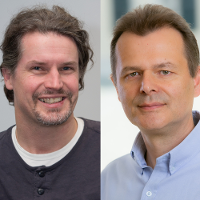
In 2021, IIASA will embark on a new strategy, which will develop and apply systems science to support transformations to sustainability. Michael Kuhn and Steffen Fritz will join the scientific leadership team that will address the institute’s research priorities to ensure that program objectives are aligned with the new IIASA strategy and institute values.
 © © Barbara Simunics, VID, © Matthias Silveri, IIASA
© © Barbara Simunics, VID, © Matthias Silveri, IIASA
(Left to right) Michael Kuhn, Steffen Fritz
Michael Kuhn, who has been appointed as the Economic Frontiers Program director, is currently coleader of the Population Economics Group at the Wittgenstein Centre (IIASA, OeAW, University of Vienna) and the Vienna Institute of Demography. Kuhn has a doctorate in economics and his research interests are in the areas of health and population economics.
The aim of the Economic Frontiers Program will be to improve human wellbeing through sustainable economic and planetary security. The program will apply systems thinking and integrate economic, societal, and environmental benefits to the entire landscape of economic planning and execution, including global economic governance, macroeconomics, and microeconomics to address issues such as planetary tipping points and looming environmental crises brought about by unfettered economic growth.
“All too often bogus economic arguments are fielded against the ever more urgent transformation of economic and social systems, institutions, and behaviors into sustainable ones. At its best, economic analysis offers powerful insights into creating incentives towards sustainable development and ensuring the implementability of relevant policies by understanding the underlying trade-offs. I am delighted about the exciting and unique opportunity to integrate economics into IIASA research as a “new kid on the block”, to collaborate with colleagues from the systems, environmental, climate, and demographic sciences in arriving at truly multidisciplinary approaches, and thereby, to take economics to its frontiers,” says Kuhn.
Steffen Fritz has been at IIASA since 2007 and is currently the Ecosystems Services and Management deputy program director. A driving force behind the institute’s citizen science activities, he also leads the Earth Observation and Citizen Science research group. Prior to joining IIASA, Fritz held positions at the Joint Research Centre in Ispra, Italy and obtained his PhD from the University of Leeds, UK.
Fritz will lead the Strategic Initiatives Program, which aims to improve the prospects of a sustainable future for humanity and to deliver transformative policy solutions. The program will draw on expertise distributed across the institute and partner organizations to engage in research projects that deliver high-impact, policy relevant research in emerging areas not emphasized in the other IIASA programs. These projects will be determined considering the global or regional policy areas or high impact global systems topics affecting IIASA member countries.
“I am excited to take up this new position and will strive to implement new initiatives that respond to the needs of humanity and our planet in a timely manner, while helping to accelerate the particular transformative changes we urgently need to tackle inequality, climate change, and the loss of biodiversity. I am looking forward to working with our National Member Organizations and my esteemed colleagues on shared research agendas that involve multi- and transdisciplinary teams. Using my expertise in spatial and earth observation data, as well as citizen science, I am confident that we will be able to design impactful, independent, transparent, and possibly open research initiatives and projects,” commented Fritz.
The program directors will provide research vision and leadership and steer the strategic positions for their programs. They will ensure effective collaboration within their own programs, between programs, as well as with all IIASA researchers and external research collaborators. In addition, the program directors are key in strengthening the institute's ability to attract external funding and be responsive to the objectives of the IIASA National Member Organizations.
IIASA Deputy Director General for Science, Leena Srivastava commented, “I am delighted that Michael and Steffen are joining the scientific leadership team. Their skills and experience will be greatly appreciated in our endeavors to maximize the impact of the institute’s work while addressing our new strategic priorities. I look forward to working with them in this capacity.”
The new program structure comprises the following programs: Advancing Systems Analysis; Biodiversity and Natural Resources; Energy, Climate, and Environment; Population and Just Societies; Economic Frontiers; and Strategic Initiatives. These appointments will commence as of January 2021 and are in addition to the program director positions announced earlier this year.
News

22 July 2024
Are sustainable aviation fuels truly sustainable?

17 July 2024
Forests endure as carbon sink despite regional pressures

16 July 2024